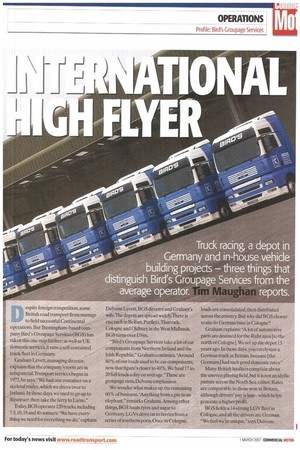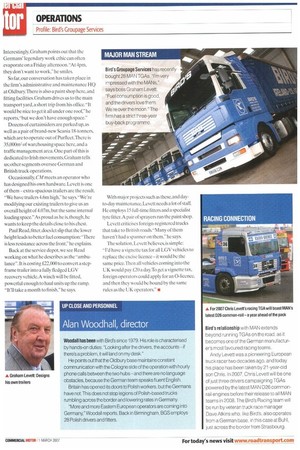Truck racing, a depot in Germany and in-house vehicle building
Page 63

Page 64

If you've noticed an error in this article please click here to report it so we can fix it.
projects — three things that distinguish Bird's Groupage Services from the average operator. reports.
espite foreign competition, some British road transport firms manage to field successful Continental a erations. But Birmingham-based com pany Bird's Groupage Services (BGS) has taken this one step •further: as well as UK domestic services, it runs a self-contained truck fleet in Germany.
Graham Leven, managing director, explains that the company's toots are in .., scrap metal.Transport services began in :.1972. he says. "We had one container on a skeletal trailer, which we drove over to ,.: 1re1and. In those days, We used logo up to i..: Stranraer, then take the ferry to Lame."
' Today BGS operates 120 trucks, including .,' • '.' 7.5,10,18 and 40-tonners."We have everyi7 thing we need for everything we do," explains Delvene Levett, BGS director and Graham's wife.The depots are spread widelY.There is one each in Belfast,Purfleet,Thurrock. Cologne and Oldbury in the West Midlands. I30S turns over f.16m.
. "Bird's Groupage Services take a lot of car components from Northern Ireland and the Irish Republic." Graham continues. "Around 80% of our loads used to be car components; now that figure's closer to 40"/..We haul 17 to 20 full loads a day on average:Mese are groupage runs, Delvene emphasises.
We wonder what makes up the remaining 60% of business. "Anything from a pin to an elephant," remarks Graham. Among other things, BGS hauls tyres and sugar to Germany. LGVs drive on to ferries from a series of southern ports. Once in Cologne, loads are consolidated, then distributed across the country. But why did BGS choose to site its German base in Cologne?
Graham explains: "A lot of automotive parts are destined for the Ruhr area [to the north of Colognej.We set up the depot 15 years ago. In those days, you rarely-saw a German truck irt Britain, because [the Germans] had such good domestic rates."
Many British hauliers complain about the uneven playing held, but it is not an idyllic picture across the North Sea, either, Rates are comparable to those won in Britain, although drivers' pay is less which helps generate a higher profit.
BCiS fields a 14-strong WV fleet in Cologne, and all the drivers are German. "We feel we're unique," says Delvene. Interestingly. Graham points out that the Germans' legendary work ethic can often evaporate on a Friday afternoon. -At 4pm, they don't want to work," he smiles.
So far, our conversation has taken place in the firm's administrative and maintenance HO at Oldbury.There is also a paint shop here, and fitting facilities. Graham drives us to the main transport yard, a short trip from his office. -It would be nice to get it all under one roof." he reports,"but we don't have enough space.
Dozens of curtainsiders are parked up, as well as a pair of brand-new Scani a 18-tonners, which are to operate out of Purfleet.There is 35,000m of warehousing space here, and a traffic management area. One part of this is dedicated to Irish movements. Graham tells us; other segments oversee German and British truck operations.
Occasionally, CM meets an operator who has designed his own hardware. Levett is one of them extra-spacious trailers are the result. "We have trailers 4.6m high," he says.-We're modifying our existing trailers to give us an overall height of 4.07m,but the same internal loading space." As proud as he is, though, he wants to keep the details close to his chest.
Paul Read,fitter, does let slip that the lower height leads to better fuel consumption:"There is less resistance across the front," he explains.
Back at the service depot, we see Read working on what he describes as the "ambulance". It is costing £22,000 to convert a stepframe trailer into a fully fledged LGV recovery vehicle. A winch will be fitted, powerful enough to haul units up the ramp.
take a month to finish," he says. With major projects such as these, and dayto-day maintenance. Levett needs a lot of staff. He employs 15 full-time fitters and a specialist tyre fitter.A pair of sprayers run the paint shop.
Levett criticises foreign-registered trucks that take to British roads."Many of them haven't had a spanner on them," he says.
The solution, Levett believes. is simple: "I'd have a vignette tax for all LGV vehicles to replace the excise licence it would be the same price.Then all vehicles coming into the UK would pay £20 a day.To get a vignette tax, foreign operators could apply for an 0-licence. and then they would be bound by the same rules as the UK operators.".


























































































































































































